Home | Category: Abbasids / Abbasids
CALIPHATE OF AL MAHDI (r. 775-785)
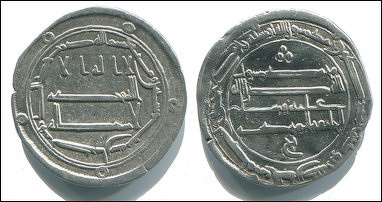
al-Mahdi dirham
Abū ʿAbd Allāh Mu ammad ibn ʿAbd Allāh al-Man ūr, better known by his regnal name al-Mahdī, was the third Abbasid Caliph, reigning from 775 to his death in 785. He succeeded his father, al-Mansur. During his rule the Abbasids engaged in several major battles with the Byzantines and the cosmopolitan city of Baghdad, attracting immigrants from Arabia, Iraq, Syria, Persia, and lands as far away as Afghanistan and Spain. Baghdad was home to Christians, Jews and Zoroastrians, in addition to the growing Muslim population. It became the world's largest city. Al-Mahdi continued to expand the Abbasid administration, creating new diwans, or departments: for the army, the chancery, and taxation. Qadis or judges were appointed, and laws against non-Arabs were dropped. [Source: Wikipedia]
Al-Mahdi means "He who is guided by God". There is some dispute over how Al-Mahdi died. One account said he fell off his horse while hunting and died. Another said he was poisoned by one of his concubines in 785 AD. The concubine, Hasanah, she was jealous of another female slave to who Mahdi was drawing closer to and her aim was to poison the rival. Hasanah prepared a dish of sweets and placed a poisonous pear at the top of the plate. The pit of the pear was removed and replaced with a lethal paste. She sent the dish to her adversary via a servant, however, Mahdi intercepted the plate and ate the pear without hesitation. Shortly afterward, he complained of stomach pain and died that night at 43 years old.
Abul Hasan Ali Al-Masu'di wrote: “Al Mahdi, the third Caliph of the Abbassid dynasty, succeeded his father, Abu Jafar Al Mansur [774 A.D.]. He was as prodigal as his father was avaricious, and rapidly squandered his vast inheritance. Al Mansur had appointed as his instructor, before he succeeded to the throne, Sharki Ibn Kotami, who was learned in all the lore and traditions of the Arabs. [Source: The Book of Golden Meadows, c. 940 CE , Charles F. Horne, ed., “The Sacred Books and Early Literature of the East,” (New York: Parke, Austin, & Lipscomb, 1917), Vol. VI: Medieval Arabia, pp. 35-89, Internet Islamic History Sourcebook, sourcebooks.fordham.edu]
"One evening Al Mahdi asked his preceptor to divert him with some amusing anecdote. "I obey, Prince. May God protect you," answered Sharki. "They relate that a certain King of Hirah had two courtiers whom he loved equally with himself. They never quitted his society night or day, in the palace or on a journey. He took no decision without consulting them, and his wishes coincided with theirs. Thus they lived together a long time; but one evening the king, having drunk to excess, drew his sword from the sheath, and, rushing upon his two friends, killed them; then he fell into a drunken slumber.
“"The next morning, when told of what he had done, he cast himself upon the earth, biting it in his fury, weeping for his friends, and bewailing the loss of them. He fasted for some days, and swore that for the rest of his life he would abstain from the beverage which had deprived him of reason. Then he had them buried, and erected a shrine over their remains, to which he gave the title, 'El-Ghareiain' (The Two Effigies). He commanded, in addition, that no persons should pass this monument without prostrating themselves.
“"Now, like the laws of the Medes and Persians, every custom set up by a King of Hirah could not be changed, but became a hard-and-fast tradition, handed on from generation to generation. The command, therefore, of the King was rigidly obeyed: his subjects, of low and high degree, never passed before the double tomb without prostrating themselves. This usage gradually acquired the binding force of a religious rite. The King had ordered that any one who refused to conform to it should be punished with death after expressing two wishes, which would be granted, no matter what they were.
Websites on Islamic History: History of Islam: An encyclopedia of Islamic history historyofislam.com ; Oxford Encyclopedia of the Islamic World oxfordislamicstudies.com ; Sacred Footsetps sacredfootsteps.com ; Islamic History Resources uga.edu/islam/history ; Internet Islamic History Sourcebook fordham.edu/halsall/islam/islamsbook ; Islamic History friesian.com/islam ; Muslim Heritage muslimheritage.com ; Chronological history of Islam barkati.net
RECOMMENDED BOOKS:
“The Great Caliphs: The Golden Age of the 'Abbasid Empire” by Amira K. Bennison Amazon.com ;
“The Abbasid Caliphate” by Tayeb El-Hibri Amazon.com ;
“Caliphate: The History of an Idea” by Hugh Kennedy Amazon.com ;
“Baghdad During the Abbasid Caliphate” by G Le Strange Amazon.com ;
“The House of Wisdom: How Arabic Science Saved Ancient Knowledge and Gave Us the Renaissance” by Jim Al-Khalili, Simon Vance, et al. Amazon.com ;
“1001 Inventions: The Enduring Legacy of Muslim Civilization: Official Companion to the 1001 Inventions Exhibition” by Salim T.S. Al-Hassani Amazon.com ;
“Pathfinders: The Golden Age Of Arabic Science” by Jim Al-Khalili Amazon.com ;
“The Arabs: A History” by Eugene Rogan Amazon.com ;
“The New Cambridge History of Islam: Volume 1, Formation of the Islamic World, 6th to 11th Centuries Amazon.com ;
“Arabs: A 3,000-Year History of Peoples, Tribes, and Empires” by Tim Mackintosh-Smith, Ralph Lister, et al. Amazon.com ;
“The Arabs in History” by Bernard Lewis Amazon.com ;
“History of Islam” (3 Volumes) by Akbar Shah Najeebabadi and Abdul Rahman Abdullah Amazon.com
Al Mahdi and the Arrogant Fuller
Abul Hasan Ali Al-Masu'di wrote: “"One day a fuller passed, bearing on his back a bundle of clothes and a mallet. The guardians of the mausoleum ordered him to kneel down. He refused. They threatened him with death. He persisted in his refusal. They brought him before the King, whom they informed of the matter. 'Why did you refuse to bow down?' asked the King. 'I did bow down,' answered the man; 'they are lying.' 'No; you are the liar!' said the King. 'Express two wishes; they shall be granted, and then you will die.' 'Nothing, then, can save me from death after those men have accused me?' asked the fuller. 'Nothing.' 'Very well,' replied the fuller, 'here is my wish: I wish to strike the King on the head with this mallet.' 'Fool!' answered the King. 'It were better worth your while to let me enrich those whom you leave behind you.' 'No,' said the fuller; 'I only wish to strike the King on the back of his head.' [Source: The Book of Golden Meadows, c. 940 CE , Charles F. Horne, ed., “The Sacred Books and Early Literature of the East,” (New York: Parke, Austin, & Lipscomb, 1917), Vol. VI: Medieval Arabia, pp. 35-89, Internet Islamic History Sourcebook, sourcebooks.fordham.edu]
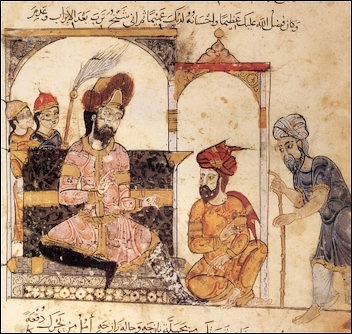
“"The King then addressed his ministers: 'What do you think,' he said to them, 'of the wish of this madman?' 'Your Majesty,' they answered, 'you yourself have instituted this law: your Majesty knows better than any one that the violation of law is a shame, a calamity, a crime which involves damnation. Besides, after having violated one law, you will violate a second, then a third; your successors will do the same, and all our laws will be profaned.' The King replied: 'Get this man to ask anything he likes; provided he lets me off, I am ready to grant all his requests, even to the half of my kingdom.'
“"They laid these proposals before the fuller, but in vain; he declared that he had no other wish but to strike the King. The latter, seeing that the man was thoroughly resolved, convoked a public assembly. The fuller was introduced. He took his mallet and struck the King on the back of the head so violent a blow that he fell from his throne and lay stretched on the ground unconscious. Subsequently he lay ill with fever for six months, and was so severely injured that he could only drink a drop at a time. At last he got well, recovered the use of his tongue and could eat and drink. He asked for news of the fuller. On being told that he was in prison, he summoned him and said: 'There is still a wish reInaining to you: express it, so that I may order your death according to law.'
“A'Since it is absolutely necessary that I must die,' replied the fuller, 'I wish to strike you another blow on the head.' At these words the King was seized with dismay and exclaimed that it was all over with him. At last he said to the fuller: 'Wretch! renounce a claim which is profitless to you. What advantage have you reaped from your first wish? Ask for something else, and whatever it is, I will grant it.' 'No,' said the man, 'I only demand my right—the right to strike you once more.'
“"The King again consulted his ministers, who answered that the best thing for him was to resign himself to death, in obedience to the law. 'But,' said the King, 'if he strikes me again, I shall never be able to drink any more; I know what I have already suffered.' 'We can not help that, your Majesty,' answered the ministers. 'Finding himself in this extremity, the king said to the fuller: 'Answer, fellow! that day when you were brought hither by the guardians of the mausoleum, did not I hear you declare that you had prostrated yourself and that they had slandered you?' 'Yes, I did say so,' answered the fuller, 'but you would not believe me.' The King jumped from his seat, embraced the fuller, and exclaimed: 'I swear that you are more truthful than these rascals, and that they have lied at your expense. I give you their place, and authorize you to inflict upon them the punishment they have deserved.'" “Al Madhi laughed heartily on hearing this story, complimented the narrator, and rewarded him generously.
Al Mahdi and His Encounters with Allah
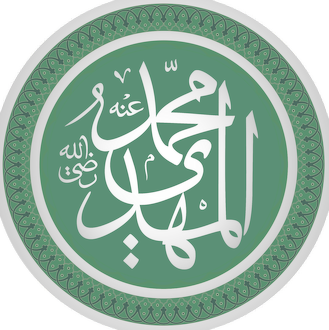
Mahdi in calligraphy
Abul Hasan Ali Al-Masu'di wrote: “The following anecdotes are related by Faika, the daughter of Abd allah: "We were one day with the Caliph Al Mahdi, who had just returned from Anbar, to which he had made a pleasure excursion, when Ar-Rabi, the chamberlain, came in, holding a piece of leather on which some words were written in charcoal, and to which was attached a seal composed of clay mixed with ashes and bearing the impression of the Caliph's signet-ring. 'Commander of the Faithful,' said Ar-Rabi, 'I never saw anything more extraordinary than this document; I received it from an Arab of the desert who was crying out: "This is the Commander of the Faithful's letter! Show me where to find the man who is called Ar-Rabi, for it is to him that he told me to deliver it!"' Al Mahdi took the letter and laughed; he then said: 'It is true: this is my writing and this is my seal. [Source: The Book of Golden Meadows, c. 940 CE , Charles F. Horne, ed., “The Sacred Books and Early Literature of the East,” (New York: Parke, Austin, & Lipscomb, 1917), Vol. VI: Medieval Arabia, pp. 35-89, Internet Islamic History Sourcebook, sourcebooks.fordham.edu]
“Shall I relate how it happened?' To this we replied: 'If it please the Commander of the Faithful.' Then he said: 'I went out to hunt yesterday evening when the shower was over. The next morning a thick mist overwhelmed us, and I lost sight of my companions; I then suffered such cold, hunger, and thirst as God only knows, and I lost my way besides. At that moment came to my mind a form of prayer which my father, Al Mansur, had taught me, saying that his father, Muhammad, had learned it from his grandfather, ali, who had been taught it by his father, Abd allah, the son of Abbas. It was this: "In the name of God," and "By the might of God! We have no power or force but in God! I fly to God for protection! I confide in God: God sufficeth me! He protecteth, sufficeth, directeth, and healeth, from fire and food, from the fall of house, and from evil death!"
“A'When I had uttered these words, God raised up a light before me, and I went toward it, and lo! I found this very Arab of the desert in his tent, with a fire which he had been just lighting up. "Arab of the desert," said I, "hast thou withal to treat a guest?" "Dismount!" said he. Then I dismounted, and he said to his wife: "Bring here that barley"; and she brought it. "Grind it," said he; and she began to grind it. I then said to him: "Give me a drink of water"; and he brought me a skin in which was a little milk mixed with water, and I drank thereof a drink such as I had never drunk before, it was so sweet! and he gave me one of his saddle-cloths, and I laid my head on it, and never did I sleep a sounder sleep.
“A'On awaking, I saw him seize on a poor miserable sheep and kill it, when his wife said to him: "Beware, wretched man! thou hast slain thyself and thy children; our nourishment came from this sheep, and yet thou hast killed it! What then have we to live upon?" On this I said: "Do not mind. Bring the sheep here"; and I opened it with the knife I wore in my boot, and I took out the liver, and having split it open, I placed it upon the fire and I ate thereof. I then said to him: "Dost thou want anything? I shall give thee a written order for it." On this he brought me that piece of leather, and I wrote on it with a bit of burnt wood which I picked up at his feet—that very note. I then set this seal on it, and told him to go and ask for one Ar-Rabi, to whom he was to give it.' This note contained an order for five hundred thousand dirhems, and Al Mahdi exclaimed on hearing it: 'By allah! I meant only fifty thousand, but since five hundred thousand are written in it, I shall not diminish the sum one single dirhem; and were there no more in the treasury, he should have it. So give him beasts of burden, and let him take it away.'
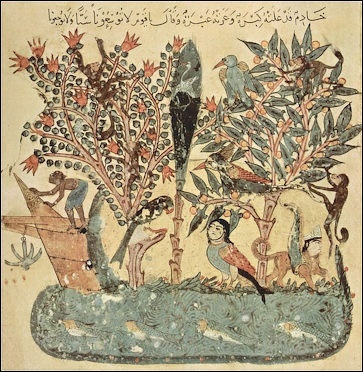
“"In a very short time that Arab had numerous flocks of camels and sheep, and his dwelling became a halting-place for those who were going on the pilgrimage, and it received the name of the 'Dwelling of the host of Al Mahdi, the Commander of the Faithful.'"
“On another occasion it is recorded that Al Mahdi went out hunting, and his horse ran away with him until he came to the hut of an Arab. And the Caliph cried: "O Arab! hast thou wherewith to feed a guest?" The Arab replied, "Yes," and produced for him a barley loaf, which Al Mahdi ate; then he brought some wine in a bottle, and gave him to drink. And when Al Mahdi had drunk it, he said "O brother of the Arabs, dost thou know who I am?" "No, by allah," he replied. "I am one of the personal attendants of the Commander of the Faithful," said Al Mahdi. "May allah prosper thee in thy situation!" returned the Arab. Then he poured out a second glass, and when Al Mahdi had drunk it, he cried: "O Arab, dost thou know who I am?" He answered: "Thou hast stated that thou art one of the personal attendants of the Commander of the Faithful." "No," said Al Mahdi, "but I am one of the chief officers of the Commander of the Faithful." "May thy country be enlarged and thy wishes fulfilled!" exclaimed the Arab. Then he poured out a third glass for him, and when Al Mahdi had drained it, he said: "O Arab! dost thou know who I am?" The man replied: "Thou hast made me believe thou art one of the chief officers of the Commander of the Faithful." "Not so," said Al Mahdi, "but I am the Commander of the Faithful himself."
“Then the Arab took the bottle and put it away and said: "By allah! wert thou to drink the fourth, thou wouldst declare thyself to be Muhammad the Prophet of God!" Then Al Mahdi laughed 'till he could laugh no more. And lo! the horsemen surrounded them, and the Princes and nobles dismounted before him, and the heart of the Arab stood still. But Al Mahdi said to him: "Fear not! thou hast done no wrong." And he ordered a robe and a sum of money to be given him.
Al Mahdi and His Vizier Yakub ibn Daud
Abul Hasan Ali Al-Masu'di wrote: “When Al Mahdi's father, Al Mansur, died, he left in the treasury nine hundred million and sixty thousand dirhems, and Abu Obaid allah, the first Vizier of Al Mahdi, advised the Caliph to be moderate in his expenses and to spare the public money. When Abu Obaid allah was deposed, his successor, Yakub ibn Daud, flattered the inclinations of the Caliph, and encouraged him to spend money, enjoy all sorts of pleasures, drink wine, and listen to music. By this means he succeeded in obtaining the entire administration of the State. One of the poets of the time composed an ode containing the following lines: "Family of Abbas! your Caliphate is ruined! If you seek for the Vicar of God, you will find him with a wineflask on one side and a lute on the other." [Source: The Book of Golden Meadows, c. 940 CE , Charles F. Horne, ed., “The Sacred Books and Early Literature of the East,” (New York: Parke, Austin, & Lipscomb, 1917), Vol. VI: Medieval Arabia, pp. 35-89, Internet Islamic History Sourcebook, sourcebooks.fordham.edu]
“Abu Haritha, the guardian of the treasure chambers, seeing that they had become empty, waited on Al Mahdi with the keys, and said: "Since you have spent all your treasures, what is the use of my keeping these keys? Give orders that they be taken from me." Al Mahdi replied: "Keep them still, for money will be coming in to you." He then dispatched messengers to all quarters in order to press the payment of the revenues, and in a very short time these sums arrived. They were so abundant that Abu Haritha had enough to do in receiving them and verifying the amount. During three days he did not appear before Al Mahdi, who at length said: "What is he about, that silly Bedouin Arab?" Being informed of the cause which kept him away, he sent for him and said: "What prevented your coming to see us?" "The arrival of cash," replied the other. "How foolish it was in you," said Al Mahdi, "to suppose that money would not come in to us!" "Commander of the Faithful," replied Abu Haritha, "if some unforeseen event happened which could not be surmounted without the aid of money, we should not have time to wait till you sent to have the cash brought in."
“It is related that Al Mahdi made the pilgrimage one year, and passed by a milestone on which he saw something written. He stopped to see what it was, and read the following line: "O Mahdi! you would be truly excellent if you had not taken for a favorite Yakub, the son of Daud." He then said to a person who was with him: "Write underneath that: 'It shall still be so, in spite of the fellow who wrote that-bad luck attend him!'" On his return from the pi]grimage, he stopped at the same milestone, because the verse had probably made an impression on his mind; and such, in fact, appears to have been the case, for very soon after he let his vengeance fall on Yakub. Rumors unfavorable to this minister had greatly multiplied. His enemies had discovered a point by which he might be attacked, and they reminded the Caliph of his having seconded Ibn Abd allah the alide in the revolt against Al Mansur.
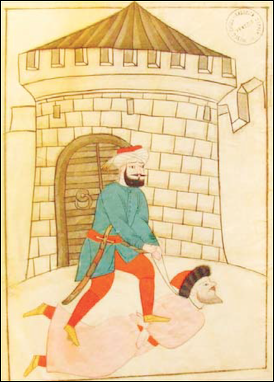
man being killed on the orders of a vizier
“One of Yakub's servants informed Al Mahdi that he had heard his master say: "The Caliph has built a pleasure-house, and spent on it fifty millions of dirhems out of the public money." The fact was that Al Mahdi had just founded the town of Isabad. Another time Al Mahdi was about to execute some project when Yakub said to him: "Commander of the Faithful, that is mere profusion." To this Al Mahdi answered: "Evil betide you! does not profusion befit persons of a noble race?"
“At last Yakub got so tired of the post which he filled that he requested of Al Mahdi permission to give it up, but that favor he could not obtain. Al Mahdi then wished to try if he was still inclined toward the party of the alides, and sent for him, after taking his seat in a salon of which all the furniture was red. He himself had on red clothes, and behind him stood a young female slave dressed in red; before him was a garden filled with roses of all sorts. "Tell me, Yakub," said he, "what do you think of this salon of ours?" The other replied: "It is the very perfection of beauty. May God permit the Commander of the Faithful to enjoy it long!" "Well," said Al Mahdi, "all that it contains is yours, with this girl to crown your happiness, and, moreover, a sum of one hundred thousand dirhems." Yakub invoked God's blessing on the Caliph, who then said to him: "I have something to ask of you." On this, Yakub stood up from his seat, and exclaimed: "Commander of the Faithful, such words can only proceed from anger. May God protect me from your wrath." Al Mahdi replied: "I wish you to promise to do what I ask." Yakub answered: "I hear, and shall obey." "Swear by allah," said the Caliph. He swore. "Swear again by allah." He swore. "Swear again by allah." He swore for the third time, and the Caliph then said to him: "Lay your hand on my head and swear again." Yakub did so.
“Al Mahdi, having thus obtained from him the firmest promise that could be made, said: "There is an alide, and I wish you to deliver me from the uneasiness which he causes me, and thus set my mind at rest. Here he is; I give him up to you." He then delivered the alide over to him, and bestowed on him the girl, with all the furniture that was in the salon and the money. When the alide was alone with him, he said: "Yakub, beware lest you have my blood to answer for before God. I am descended from Fatima, the daughter of Muhammad, on whom God's blessings and favors always repose." To this Yakub replied: "Tell me, sir, if there be good in you." The alide answered: "If you do good to me, I shall be grateful and pray for your happiness." "Receive the money," said Yakub, "and take whatever road you like." "Such a road," said the alide, naming it, "is the safest." "Depart with my good wishes," said Yakub.
“The girl heard all this conversation, and told a servant of hers to go and relate it to Al Mahdi, and to say in her name: "Such is the conduct of one whom in giving me to him you preferred to yourself; such is the return he makes you for your kindness." Al Mahdi immediately had the road watched, so that the alide was taken prisoner. He then sent for Yakub, and said to him: "What has become of that man?" Yakub replied: "I have delivered you from the uneasiness he gave you." "Is he dead?" "He is." "Swear by allah." "I swear by allah." "Lay your hand upon my head." Yakub did so, and swore by his head. Al Mahdi then said to an attendant: "Boy, bring out to us those who are in that room." The boy opened the door, and there the alide was seen with the very money which Yakub had given him. Yakub was so much astounded that he was unable to utter a word. "Your life," said Al Mahdi, "is justly forfeited, and it is in my power to shed your blood, but I will not. Shut him up in the matbak." He had him confined in that dungeon, and gave orders that no one should ever speak to him or to any other about him. Yakub remained there during the rest of Al Mahdi's reign (over two years), and during the reign of Musa-al-Hadi, the son of Al Mahdi, and during five years and seven months of the reign of Haroun Al Rashid.
Al Mahdi and the Poet Abu'l Atahiyah
Abul Hasan Ali Al-Masu'di wrote: “Some historians relate that the poet Abu'l Atahiyah had conceived a passion for Otbah, the slave of Khayzuran, the chief wife of the Caliph. This young girl complained to her mistress of the gossip to which this affair gave rise. One day Al Mahdi found her seated near her mistress in tears. He questioned her, and having discovered the cause of her grief, sent for Abu'l Atahiyah. When the poet came and stood before him, Al Mahdi said to him: "You are the author of this verse concerning Otbah: 'May God judge between me and my mistress, since she shows me nothing but disdain and reproach!'" He then continued: "What kindness has Otbah ever shown you that you have the right to complain of her disdainfulness?" [Source: The Book of Golden Meadows, c. 940 CE , Charles F. Horne, ed., “The Sacred Books and Early Literature of the East,” (New York: Parke, Austin, & Lipscomb, 1917), Vol. VI: Medieval Arabia, pp. 35-89, Internet Islamic History Sourcebook, sourcebooks.fordham.edu]
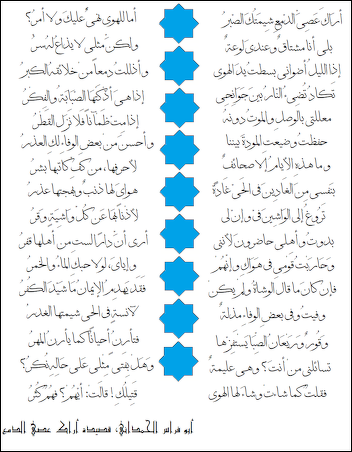
Abbasid-era Arabic poem
"Sire," answered Abu'l Atahiyah, "I am not the author of that verse, but of these:
"'O my camel, carry me rapidly;
be not beguiled by what thou deemest repose—
Carry me to a Prince to whom
God has given the gift of working miracles;
'Prince who, when the wind rises, says,
"O wind, hast thou partaken of my benefits?"
Two crowns adorn his brow
—the crown of beauty and the diadem of humility.""
“Al Mahdi sat silent for some time, looking at the ground which he tapped with his staff; then he lifted his head and continued: "You have also said:
"'What does my mistress think upon
when she displays her charms and allurements?
There is among the slaves of Princes
a young girl who conceals beneath her veil Beauty itself.'
“"How do you know what she conceals beneath her veil?" the Caliph asked. Abu'l Atahiyah replied in the same dattering style:
"Royalty has come to do him obeisance,
and trailing her robe majestically,
She only is fit for him, as he for her."
“But as the Caliph continued to ply him with questions Abu'l Atahiyah became embarrassed in his answers, and was condemned to expiate his temerity by a flogging. He had just undergone his punishment when Otbah met him in this piteous plight. The poet reproached her thus: "Praise be to thee, Otbah! It is because of thee that the Caliph has shed the blood of a man already dying of love." Tears started to Otbah's eyes; she ran sobbing to her mistress, Khayzuran, and there met the Caliph. He asked why she wept, and hearing she had seen the poet after his flagellation, consoled her; then he caused a sum of fifty thousand dirhems to be given to the former. Abu'l Atahiyah distributed them to all those whom he met in the palace. Al Madhi, being informed of his generosity, asked him why he had thus disposed of the money he had just received from the Caliph. The poet answered: "I did not wish to profit by what my love had won." Al Mahdi sent him fifty thousand more dirhems, making him swear not to employ them in fresh benefactions.
“Another historian relates that Abu'l Atahiyah, on a certain New Year's Day, presented Al Mahdi with a Chinese vase containing perfumes. On the vase were engraved these verses:
"My soul is attached to one of the good things of this world;
the accomplishment of its desires
depends on God and Al Mahdi, his Vicar.
I despair of obtaining my object,
but thy contempt of the world
and all which it contains reanimates my hope."
“The Caliph thought of giving him Otbah, when she said to him. "Prince of the believers! would you, in spite of my privileges, my rights, and my services, bestow me upon a pottery merchant—a man who makes money out of his poetry?" Al Mahdi then sent a message to the poet: "As to Otbah, you will never obtain her, but I have ordered the vase you sent to be filled with money." Soon afterward Otbah, passing by, found the poet disputing with the clerks of the treasury, and maintaining that by "money" the Caliph meant gold dinars, while they alleged that he only intended silver dirhems. "If you really loved Otbah," she said to him, "you would not think of the difference between gold and silver."
Death of Al Mahdi
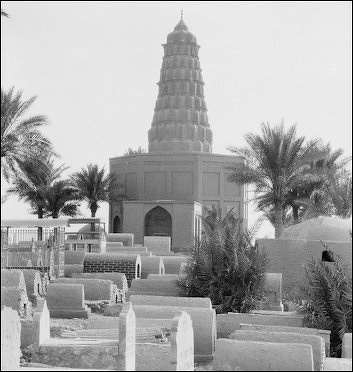
Abbasid tomb in Baghdad
Abul Hasan Ali Al-Masu'di wrote: “Tabari, the historian, describes the death of Al Mahdi as taking place in the following tragic manner: Among his wives there were two for whom he seems to have entertained an equal degree of affection; but as one of them seemed to the other to have the preference in his heart, the latter, whose name was Hassanna, conceived a bitter jealousy against her rival, and determined to be avenged on her. [Source: The Book of Golden Meadows, c. 940 CE , Charles F. Horne, ed., “The Sacred Books and Early Literature of the East,” (New York: Parke, Austin, & Lipscomb, 1917), Vol. VI: Medieval Arabia, pp. 35-89, Internet Islamic History Sourcebook, sourcebooks.fordham.edu]
“In order to accomplish her purpose, she prepared a dish of confectionery, in which she mixed a malignant poison, and sent it as an offering to her rival. As the damsel who was dispatched upon the errand happened to pass beneath one of the balconies of the palace, Al Mahdi, who was watching the sunset, saw her. The confectionery, which was uncovered, attracting his notice, he asked the messenger whither she was bound. She having informed him, he took and ate heartily of it, saying: "Hassanna will, I am sure, be better pleased that I should partake of her sweets than any one else." In a few hours he was a corpse. Image Sources: Wikimedia Commons
Text Sources: Internet Islamic History Sourcebook: sourcebooks.fordham.edu ; Arab News, Jeddah; “Islam, a Short History” by Karen Armstrong; “A History of the Arab Peoples” by Albert Hourani (Faber and Faber, 1991); Metropolitan Museum of Art, Encyclopedia.com, National Geographic, BBC, New York Times, Washington Post, Los Angeles Times, Smithsonian magazine, The Guardian, Al Jazeera, The New Yorker, Reuters, Associated Press, AFP, Library of Congress and various books and other publications.
Last updated April 2024
